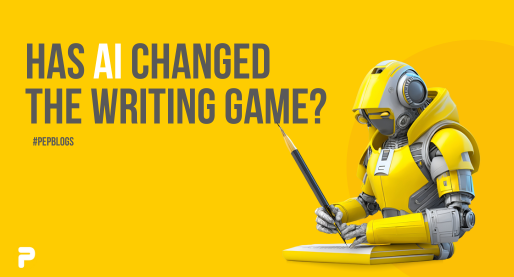PCG Blog
23
April 2023
Has AI Changed The Writing Game?
Hithaishi Chandrashekhar

Over the past decade, AI has been transforming industries and revolutionising the way we work. The writing industry is no exception. With AI tools such as WriteSonic and ChatGPT, writers can now generate content in seconds.
The bigger question, however, is has AI truly changed the writing game?
Traditionally speaking, content creation has been a manual process that involves extensive research, outlining, and writing. In the current scenario, AI-powered tools have made content creation faster, more efficient, and less time-consuming. And this is one of the key advantages of AI-powered content drafting tools. They are designed to analyse vast amounts of data and produce content that is engaging, informative, and relevant to the target audience. However, AI tools also have shortcomings alongside their benefits. Let's take a closer look.
How do AI tools benefit content writing?
-
Speed and Efficiency: AI tools can generate content at lightning speed, saving writers valuable time and effort.
-
Consistency: AI tools can maintain a consistent tone and style, which is particularly helpful for brands and businesses that require a consistent tone and voice.
-
Language and Grammar: AI tools are programmed to ensure that content is grammatically correct and free of errors.
-
Topic Research & SEO Optimisation: AI tools can analyse large amounts of data and generate content based on specific topics and keywords. AI tools are also useful for SEO optimisation. They can help writers identify keywords and key phrases that are likely to attract more traffic to a website.
What can AI-generated content lack?
AI cannot read your mind. It cannot particularly decide what is the tone you want. It does not understand the context that is needed. In other, simpler words - the output is only as good as the input.
AI tools can you give you a lovely piece of 500 words in 2 minutes. But the prompts fed to the system have a significant impact on the content generated. Unless the individual using the tool understands AI and is trained in terms of the inputs provided to the tool, AI tools are not as useful as we have discussed so far. The tools can, in fact, provide content worse than what a beginner would right. Hence, individuals need to be AI-trained and provided with a good understanding of how AI works, so that they can reap the benefits of AI tools in writing.
AI tools can be a writer’s closest buddies or the worst enemies. Especially for those starting off their writing journey, using AI to write a piece of content is harmful to development. Quite often, the research remains incomplete simply because AI fills up some of the gaps - and you think you got it right. But there is a whole world of alternatives there - and since you stopped researching, your prompts remain stale - so the content you get remain stale as well.
Writing is a craft that requires creativity, critical thinking, and an understanding of the nuances of language. While AI tools can be helpful, they should not replace the essential skills and training that new writers need to develop.
In conclusion, AI tools have undoubtedly changed the writing game, providing writers with unprecedented speed, efficiency, and accuracy. However, AI tools are not perfect, and they should not replace the essential skills and training that new writers need to develop. AI can be a useful tool for professionals, but balancing the benefits with the limitations and the need for human expertise is very important. Additionally, individuals must be AI-trained and AI-ready in order to be able to rightly use the AI tools.
